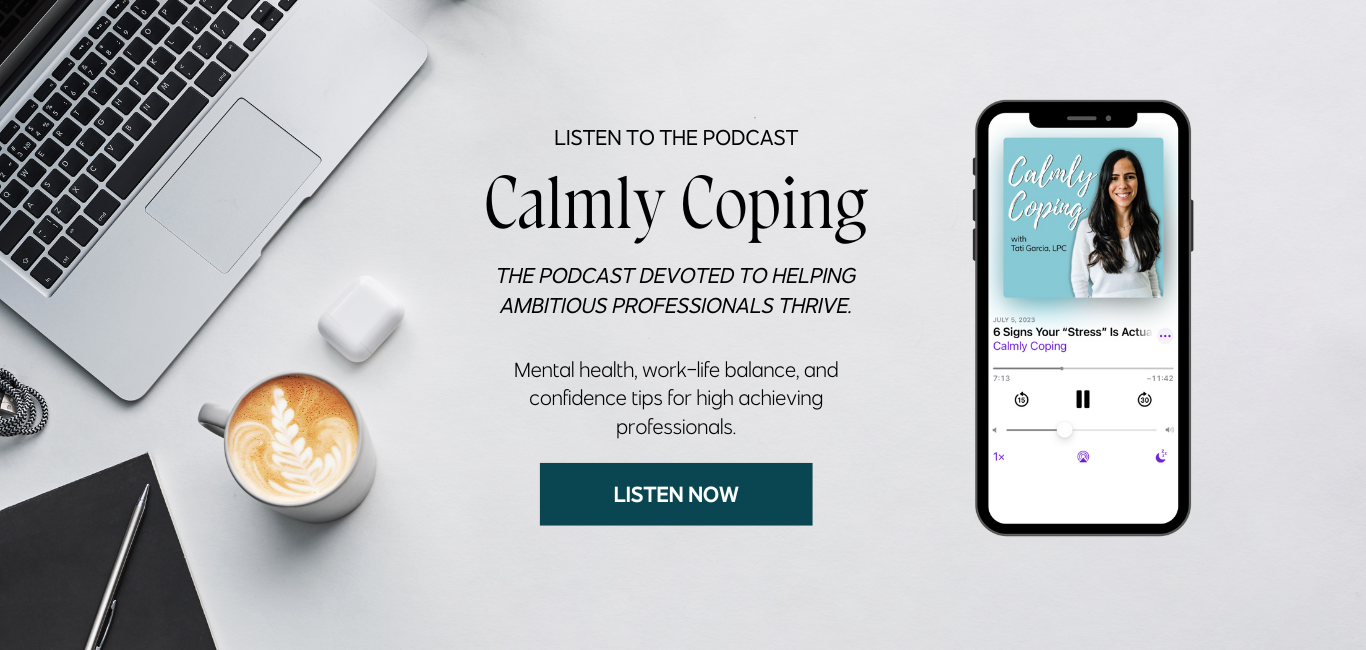When you’re ambitious, you can find yourself caught in a perpetual cycle of striving for more, pushing boundaries, and yet, despite all accomplishments, wrestling with a nagging feeling of inadequacy and needing to achieve more. Why does each achievement feel like a fleeting victory rather than a lasting satisfaction? If you’ve ever felt the weight of your own expectations, if success is a moving target, and if it never feels good enough, you’re not alone. In this episode, we’ll delve into the double-edged sword of ambition: the insatiable and often uplifting desire for more, along with the underlying feeling that it’s never enough. What’s underlying this battle, and what can you do about it to create a healthier relationship with ambition?
In this episode, you will learn:
- The signs your ambition has become unhealthy and is negatively impacting your mental health
- Whether or not dissatisfaction is a necessary component for ambition
- 4 concrete tips to create a healthy relationship with ambition
LISTEN NOW:
🎧 CLICK HERE TO LISTEN TO CALMLY COPING WHEREVER YOU LISTEN TO PODCASTS
WATCH NOW:
FREE TRAINING: How to Create Work-Life Balance and Feel Calmer From Within
If you want to learn how to take back control of your life so you can feel calmer and more confident, and learn the tools to spend your time according to what matters most to you (no matter what your schedule is like right now)…

LISTEN, REVIEW, AND SUBSCRIBE TO THE PODCAST!

INTRO/OUTRO MUSIC: Rescue Me (Instrumental) by Aussens@iter (c) copyright 2018 Licensed under a Creative Commons Attribution (3.0) license. http://dig.ccmixter.org/files/tobias_weber/57990 Ft: Copperhead
DISCLAIMER: All content here is for informational purposes only. This content does not replace the professional judgment of your own mental health provider. Please consult a licensed mental health professional for all individual questions and issues.
Interested in diving deeper to get support for high-functioning anxiety?
I offer 1:1 coaching to help high-achievers overcoming high-functioning anxiety so they can feel calmer, more present, and have improved balance in their lives. Click here if you’re interested in learning more and getting started.
Calm, Balanced, & Confident is my comprehensive A→Z self-paced course to help high-achieving professionals overcome high-functioning anxiety so they can feel calmer, balanced, and more confident without the anxiety and overwhelm. Click here to learn more and enroll today.
Looking for ongoing support and guidance with high-functioning anxiety? The Calm & Ambitious Community is the exclusive community for high achievers with high-functioning anxiety. Click here to learn more and join us today!
TRANSCRIPT:
Click to view the episode transcript.
When you’re ambitious, you can find yourself caught in a perpetual cycle of striving for more, pushing boundaries. And yet, despite all accomplishments, you still have a nagging feeling of inadequacy and needing to achieve more. Why does each achievement feel like a fleeting victory rather than a lasting satisfaction?
If you’ve ever felt the weight of your own expectations, if success is constantly a moving target, and if it never feels good enough, You’re not alone. In this episode, we’ll delve into the double edged sword of ambition, the insatiable and often uplifting desire for more, along with the underlying feeling that it’s never enough.
What’s underlying this battle and what can you do about it to create a healthier relationship with ambition?
Welcome to Calmly Coping. My name is Tati Garcia and I’m a licensed therapist and coach specializing in high functioning anxiety. I help high achievers stop putting themselves last so they can feel more calm, balanced, and confident from within. If this topic interests you, then please like, subscribe, and hit the notification bell so you’ll be notified every time I release a new episode.
Thank you so much for tuning in. So I recently finished watching the series of Mad Men. And I was struck by this one line when I was watching one of the episodes that I had to immediately write it down. And it was by one of the characters named Trudy Campbell. So she is Peter Campbell’s wife. And she was talking to him and said this, “Dissatisfaction is a symptom of ambition. It’s the coal that fuels the fire.”
This was something that struck me because It made me reflect on whether or not dissatisfaction is really something that fuels that fire of ambition. Is dissatisfaction something that is necessary for ambition? Oftentimes we can be in this place of feeling ambitious and having these goals and then simultaneously feeling like we don’t have enough and that is the driving force to continue working towards achieving more.
Now first let’s take a step back and look at what ambition means. So the definition of ambition is a strong desire to do or achieve something, typically requiring determination and hard work. So ambition in and of itself is not a bad thing. It’s not a bad thing to want to achieve things, to want to put hard work into things.
That’s how we accomplish things. That’s how we make innovations as human beings. That’s how we help other people. That is how we survive and thrive. Ambition isn’t the evil thing here. It’s about what drives that ambition that is the focus. So let’s talk about what it looks like when ambition becomes unhealthy. So when does ambition lead to more unhappiness and lead to worsening mental health? So it could be when you are focusing on the outcome more than the process. And by this, I mean, you’re focusing on getting that achievement rather than the path or the journey to get there. It’s that cliche to focus more on the journey than the destination.
And when you are hyper focused on the destination or the outcome or the achievement, There can oftentimes be this belief that I must achieve this thing and then I’ll be happy. You know, once I get to this milestone, then I’ll be happy, then I’ll be able to relax, then I’ll be able to slow down, then I’ll have more freedom, then I’ll be able to do what I want, whatever it is you want for yourself.
This focus on the outcome can result in that kind of thinking. But what happens, as we know, if you’re somebody who’s ambitious, is that that moment never comes. You reach that goal, and then it’s the next thing. And then also, because we adapt as humans to our situation, where you are now is probably what you wanted in the past.
It just feels familiar because you’ve adapted to these circumstances. Another way that ambition can become unhealthy is when you attach your self worth to your achievements. So you believe that you are only as good as the things that you have accomplished and you’re looking to external achievements to define how you feel about yourself and how good you are as a person.
So for example, If you only feel good about yourself when you get a promotion, or when you have a certain title, or when you achieve a certain status, or get a degree, or get a raise, you’re dependent on these achievements in order to feel good about yourself. And that means that your self worth goes up and down as a result of what you do or don’t accomplish.
And so if you’re in a place where you haven’t accomplished anything recently, or you feel like you aren’t doing well, that means you’re going to feel bad about yourself as a person. And that’s going to have a negative impact on your self image and on the way that you feel about yourself on your self confidence.
And you might be struggling, you might struggle more with things like imposter syndrome or feeling like you need to prove yourself to others or feeling like you constantly need to achieve and accomplish more. So, another way that ambition can become unhealthy is when you’re not able to celebrate or acknowledge your achievements.
So you may be constantly focusing on the negative and your thought process might be that you accomplish something, but then it’s like, well, it’s still not good enough or, oh, but I still need to do this or, oh, I’ll be good enough when I achieve this, or I’ll be able to rest when I achieve this, kind of that way of thinking, but really you’re.
Maybe even minimizing or downplaying your celebrations or accomplishments. You are seeing them as not that big of a deal or it’s not that important. Or if you’re also achieving something and then immediately moving on to the next thing, this can go hand in hand with having difficulty with celebrating or acknowledging your accomplishments because you’re accomplishing something or doing well on something, even if it is something minor or small and you’re just on to the next or even while you’re still working on that thing.
You’re already thinking about what’s the next project, what’s the next milestone, what’s the next thing that I have to do or that I’m working towards. And all these things can result in negative effects to your mental health. So you may feel anxiety, depression, stress, or any of the symptoms of those struggles.
So you may be in a place where you’re overthinking things or feeling badly about yourself or really being hard on yourself. Even though you have. accomplished a lot, or even though you are moving towards goals and in the direction you want. That’s when it can feel really confusing, when it seems as though you’ve gotten to the place where you thought you wanted to be, but you’re still not happy.
And that’s really when ambition can become unhealthy. when you are continuing to work towards these milestones, but inside you’re still feeling emptiness. You’re still feeling like you need to be striving for more. So I want to touch on what I mentioned earlier about dissatisfaction, about that quote from Trudy.
Is dissatisfaction necessary for ambition? I mean, My answer is no. If you disagree with me, I’d love to hear your thoughts. I’d love to start a conversation about this, but here’s the thing. So ambition can certainly come from dissatisfaction. In many ways that ambition can have an unhealthy impact on you.
It’s often coming from dissatisfaction. It can come from this place of I’m not happy with where I am. So I need something better. I need something more. But the idea that dissatisfaction is necessary for ambition creates a false dichotomy. It creates this division and this idea that that satisfaction cannot create ambition.
So that we must be dissatisfied and then ambition follows. And it does not leave room for being satisfied. and then ambition can follow. And that’s what I’m going to talk about more is that we can be in a place of satisfaction and fulfillment and still be ambitious. The two can coexist and you can feel ambitious from a place of excitement and fulfillment.
Maybe feeling excited that I want to help more people. I want to spread this message. I want to create more freedom for my family. I want to have. x, y, and z, whatever it is, and that can be coming from a place of already feeling fulfilled. So I’m satisfied and I want to keep going. And purpose can be a big part of this.
When you have a strong purpose and an ability to be present for your achievements, then ambition can follow, that healthy ambition. And that purpose, of course, is going to be personal to you, whether it is the purpose of caring for your loved ones, or whether it is the purpose of helping other people through your career, or the purpose of spreading some sort of message.
It’s really going to be personal to you, but that can be helpful to create that healthy sense of ambition. So now let’s talk about some practical ways to create a healthy relationship. with ambition. So tip number one to create a healthy relationship with ambition is to focus on cultivating self worth.
So before I talked about having an unhealthy relationship with ambition could occur when your self worth is contingent upon your achievements. And so that’s what is really driving that not good enough feeling. So when you feel like you’re not good enough. That is a consequence of a low self worth and, you know, it’s cyclical, you know, having a low self worth creates that feeling of not being good enough and vice versa.
So that self worth is just how you feel about yourself as a person, how valuable and worthy you feel you are as a person. And you can cultivate self worth. outside of your achievements and the things that you do. And this is what’s going to give you a solid foundation to have a healthy ambition. So ways that you can cultivate self worth are through setting boundaries.
When you set boundaries, you are communicating to yourself and to others, my time, my energy. So, for example, a way of setting boundaries is through saying no and saying that, okay, I have other commitments and I can’t do this right now. My time and my commitments are worthy of being upheld. If it is saying that I’m going to stop work at a certain time, it is saying that your work life balance is something that is important to you and you are worthy of upholding those boundaries. Another way of cultivating self worth is by improving your self talk. That is just the way that you speak to yourself in your head. Oftentimes we can be really hard on ourselves, we can be really critical, we can say harsh and mean things to ourselves. And when you can notice and replace those negative thoughts with positive ones, especially the thoughts where you’re saying, “I’m not good enough, I’m stupid, I’m a loser.” If you can notice those thoughts and replace them with more compassionate and kind statements, then that is a way to help increase your self worth. And another way to cultivate self worth is to practice self care. So this is just taking care of yourself. This can be the basics of hygiene, of exercise, of doing things that you love.
Spending time with people that you enjoy, anything that’s going to help you to feel good about yourself, especially when it comes to the basics of caring for yourself. That is a way of communicating to yourself that I am worth spending this time and energy on myself. And that’s going to help you feel better about yourself.
So these are just some examples of ways that you can cultivate self worth. Now, the next tip to achieve a healthy relationship with ambition is to set clear and achievable goals. When you aren’t specific with what you want to achieve, then your success can feel like it’s never enough because it can feel like you don’t really know what you’re working towards.
Maybe you have a general idea in your mind, but if you’re not clear and you haven’t sat down and identified and been specific. With what it is that you want to achieve and being specific as specific as possible using measures if you can like numbers, like income, like whatever it is that’s related to what you want to achieve, that’s going to be helpful because it’s going to give you something clear to work towards and it’s going to help to build that sense of accomplishment that you feel rather than constantly moving from one thing to the next. Next, I want you to celebrate your achievements. I mentioned before that when you have an unhealthy relationship with ambition, you’re not celebrating your achievements. So this is kind of naturally follows that if you want to have a healthy relationship with ambition, you’re going to want to celebrate your achievements.
So this can be mentally by congratulating yourself, by writing them down, by being intentional with really recognizing what you are doing well and reflecting upon that. You can journal about it. You can talk to somebody that you care about and say, I’m really proud of myself for this. And you can also do something that is an experience.
You know, you can have a special event. You can just go out to a nice dinner or see a movie that you enjoy. and really be intentional with, okay, this is to celebrate this achievement. It doesn’t have to be something grandiose. It doesn’t have to be something that requires a lot of time or money or energy.
It could just be something simple that is a way of celebrating and acknowledging what you have achieved. And my next tip is to focus on fulfillment. while you’re achieving while you have these ambitious goals for yourself. So this is all about letting go of the idea that you need to accomplish something in order to be happy.
It’s what I talked about before that I won’t be happy until I get this job until I make this amount of money, etc, etc, etc. Of course, achieving those things. is going to be helpful and is going to be something that is a positive experience. However, when we get tied to the idea that I need this in order to be happy, or I can’t be happy until this point, then we really deprive ourselves of present moment happiness and fulfillment.
And you can cultivate happiness and fulfillment now, before you even achieved the thing. I was recently reading a book by one of my favorite authors, who is a Buddhist monk. His name is Thich Nhat Hanh. The book is No Mud, No Lotus. And he talks about the conditions for happiness. And he says that there are so many conditions for happiness available to us right now that we don’t even recognize.
It could be, you know, looking outside at the trees and seeing the sunset or the sunrise and listening to the birds chirping or, you know, noticing your and being grateful for your morning cup of tea or coffee or acknowledging the fact that you can see if you’re able to or that you can walk or whatever it is that just you’re makes the idea of being alive beautiful and amazing.
And I’m sure that you have so many more things to be happy about. However, when we’re in this place of ambition that is coming from a place of dissatisfaction, the focus tends to be on the negative and what we don’t have. The more you can cultivate this feeling of happiness for what you already have, what you already are, then that’s when you can achieve that ambition from that place of satisfaction and fulfillment.
One thing that can be helpful is to identify your why and ask yourself, why are you achieving? Why are you working towards this? Why is this important to you? And that can help to connect you with that sense of inner fulfillment and purpose. So for example, my why for being present on this podcast and sharing these thoughts is that I love learning and I love discussing concepts like this and it really lights me up and excites me.
And I also love the fact that I can help other people and help other people to see things in a different way so that they don’t have to struggle, so that they don’t have to be so hard on themselves. That is something that is truly fulfilling for me. And if I get in a place where I find that I’m just moving from one thing to the next and losing connection with that purpose and with that inner fulfillment, then I make sure to really try and connect back to that and remind myself of why I’m doing this in the first place.
So some final thoughts. When you can cultivate feeling good enough as something that is separate from your achievements. That’s when you can have a healthy relationship with ambition. I know this is something that’s possible for you. If you’re looking to dive deeper, I have a free training where I talk more about my three phases to help you to create work life balance and feel calmer from within as a high achieving professional.
You can learn more about this training and sign up for free by going to calmlycoping.com/workshop. And if you’re interested in one to one support to help you increase yourself worth, cultivate work life balance. And feel more fulfilled with your personal and professional lives. Then I have openings for one to one coaching.
You can learn more about my coaching packages and how it can support you by clicking on the work with me link in the description or the show notes, depending on where you are tuning in. So I’d love to hear your thoughts. On this topic, if you’re watching on YouTube or listening to the podcast on Spotify, let me know your thoughts on this question.
What do you enjoy about being an ambitious person? And while you wait for next week’s episode, I have other episodes about calming your mind, creating work life balance, and feeling more confident from within. You can check out these episodes here. Thank you so much for tuning in today and until next time, be calm.


Until next time…













